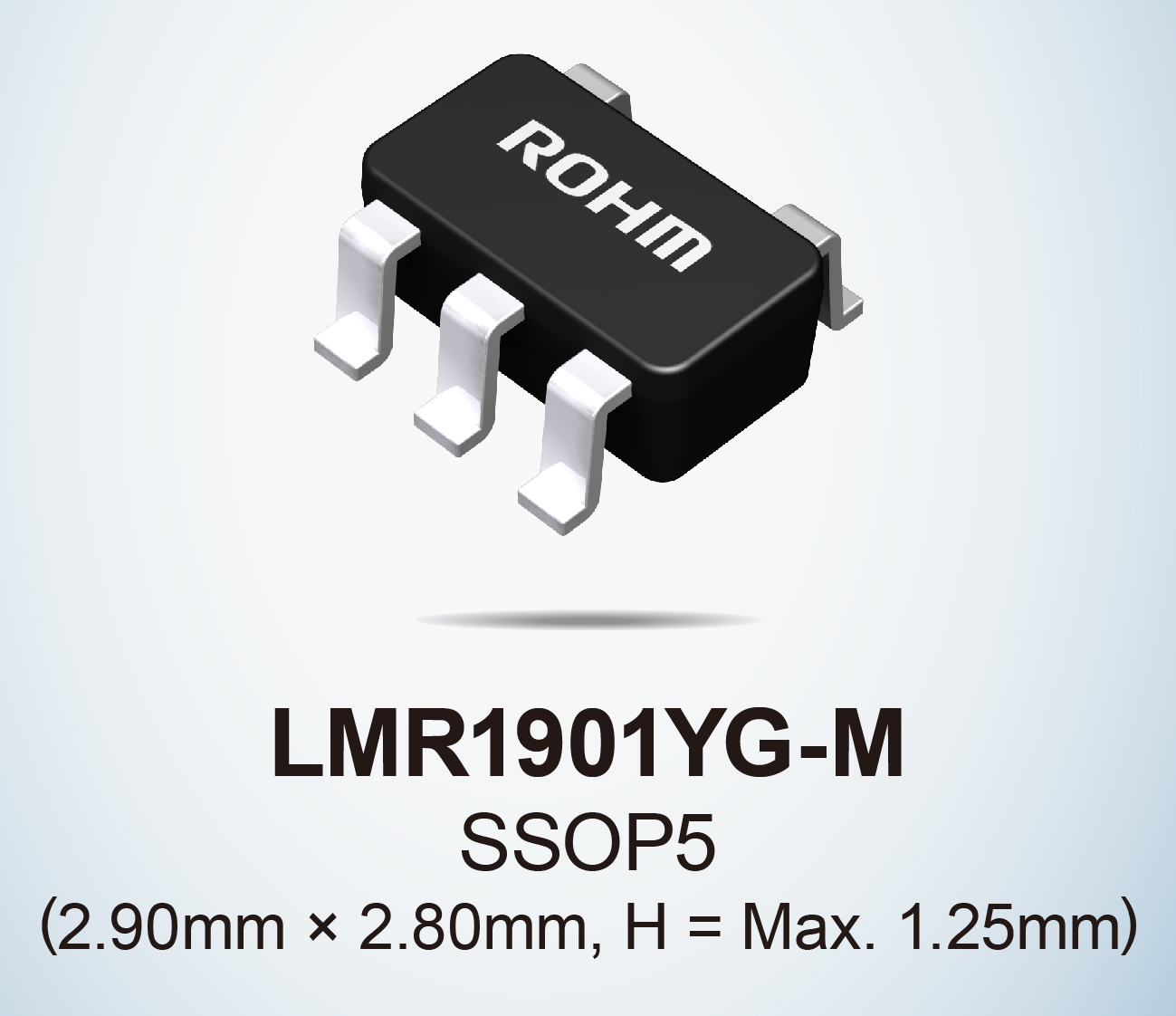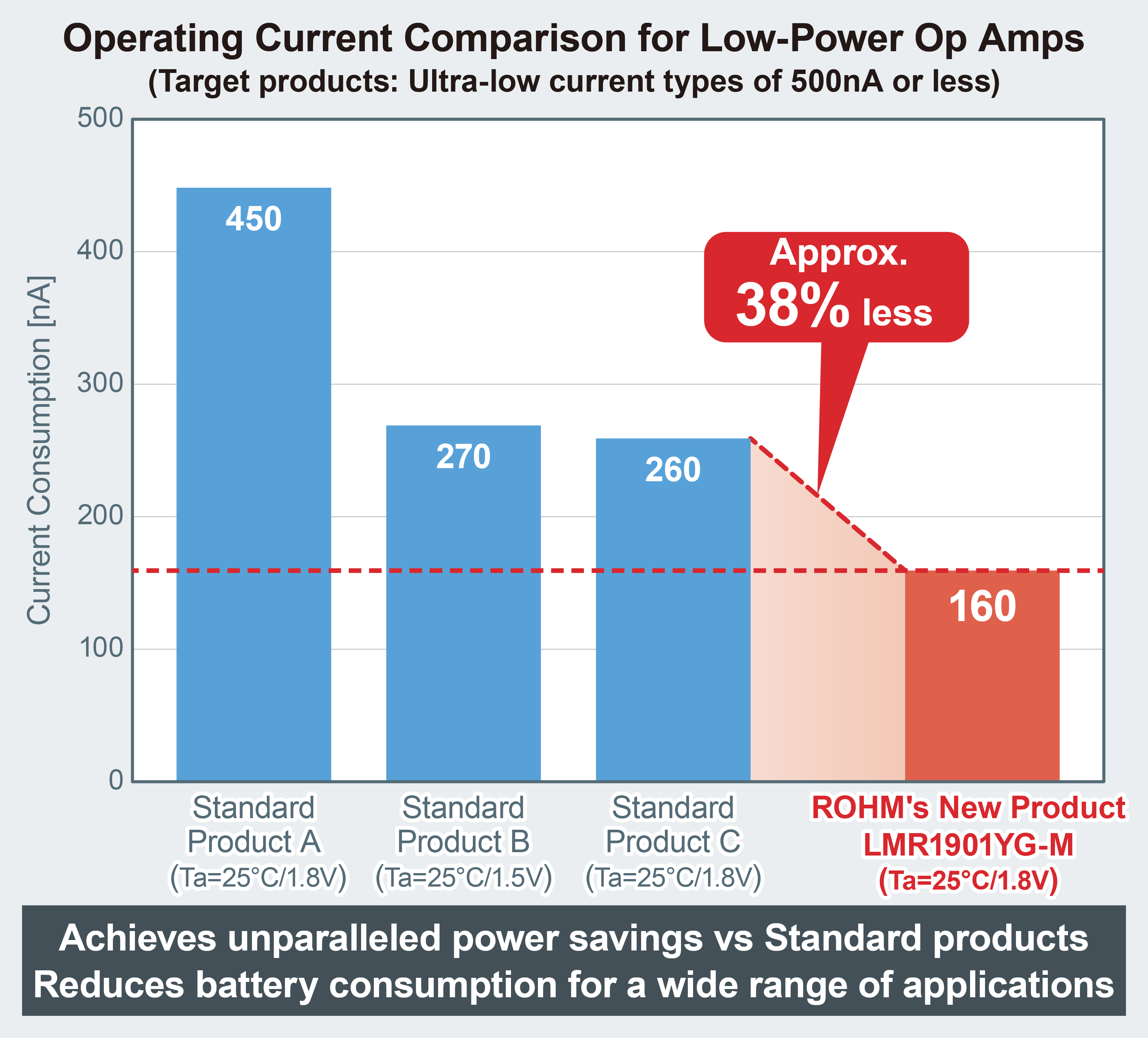ROHM’s new op amp that minimises current consumption
ROHM has developed a linear operational amplifier (op amp) – LMR1901YG-M – featuring the lowest current consumption in the industry, based on a ROHM April 2024 study.
This makes it ideal for amplifying sensor signals used to detect and measure temperature, flow rate, gas concentration, and other parameters in applications powered by internal sources (i.e. batteries).

In recent years, advanced control has been in increasing demand for various applications in consumer and industrial electronics. Therefore, there is an increasing need for accurate sensing of parameters relevant to the application such as, temperature, humidity, vibration, pressure, and flow rate.
Op amps whose main function is to amplify sensor signals for subsequent detection and/or analog-to-digital conversion, is a crucial component in the signal chain – greatly affecting both accuracy and power consumption. ROHM is developing op amps that satisfy the dual need for high accuracy and low current consumption. By further refining the circuit design based on original Nano Energy technology, ROHM is now able to offer an op amp that delivers the lowest current consumption on the market.
The LMR1901YG-M leverages original ultra-low power technology that thoroughly suppresses current increase caused by temperature and voltage changes to reduce current consumption to just 160nA (Typ.), approximately 38% lower than that of general low power op amps. This not only extends the life of applications powered by internal batteries like electronic shelf labels, but also contributes to longer operating times for smartphones and other devices equipped with rechargeable batteries. At the same time, this low current consumption does not change over the temperature range of –40°C to +105°C - allowing stable low-power operation, even in environments where external temperatures fluctuate, including fire alarms and environmental sensors.

Other performance enhancements include 45% reduction of input offset voltage to just 0.55mV (Max. Ta=25°C) over general low-current op amps while a maximum input offset voltage temperature drift of 7V/°C is guaranteed. This enables high accuracy amplification of sensor signals. Capable of operating from 1.7V to 5.5V supply voltage and offering rail-to-rail input/output, LMR1901YG-M is suitable for a wide variety of applications in the industrial equipment and consumer markets.
ROHM’s new op amp also complies with the automotive reliability standard AEC-Q100 ensuring stable operation even under harsh conditions such as vehicle cabins without compromising functionality.
In addition to various technical documents necessary for circuit design and SPICE models for simulation (available free of charge on ROHM’s website), the LMR1901YG-M can be used with ROHM Solution Simulator to speed up time to market.
Going forward, ROHM will continue to pursue further power savings in op amps using proprietary ultra-low power technology. On top, ROHM aims to improve the performance of op amp lineups by reducing noise and offset increasing power savings and expanding the power supply voltage range while contributing to solving social issues through higher accuracy application control.
Product lineup

Application examples
- Consumer applications: smartphones, smartwatches, wearables, fire alarms, motion sensors, and more
- Industrial equipment: electronic shelf labels (ESL), handheld measurement instruments, data loggers, environmental sensors for IoT, and more
- Automotive systems: anti-theft sensors, drive recorders, and more
- Sales launch Date: now (in mass production)
- Online distributors: DigiKey, Mouser, and Farnell
- The products will be offered at other online distributors as they become available.
What is Nano Energy technology?
Nano Energy refers to proprietary ultra-low current consumption technology that achieves a current consumption on the order of nano ampere (nA) by combining advanced analog technologies covering circuit design, layout, and processes utilising ROHM’s vertically integrated production system.
This contributes to not only extending the operating time of battery operated IoT and mobile devices, but also improved efficiency in industrial and automotive equipment where increased power consumption is problematic.











